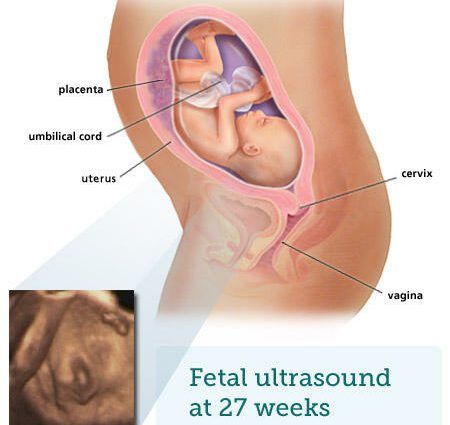Contents
- 6th month of pregnancy: the 23rd week
- 24th week of pregnancy: the fetus feels, hears and reacts!
- Six months pregnant: 25 weeks pregnant
- 6 months pregnant: the 26th week of pregnancy
- How do you know if everything is going well with the baby?
- How much weight gain at 6 months of pregnancy?
- Sixth month of pregnancy: ultrasound, procedures and exams
6th month of pregnancy: the 23rd week
Our baby is a beautiful child, 28 cm from head to heels, weighing 560 grams ! The dental buds already secrete what will make the ivory of future baby teeth. The lanugo, this fine down, now covers his entire body, whose skin has thickened with the formation of vernix caseosa. Our child moves a lot, and performs an average of 20 to 60 movements per half hour.
Our pregnant woman’s body also changes a lot during this 6th month of pregnancy. Everything is being put in place to allow our baby to have room to grow properly: our uterus is still growing, moving our organs, – which can cause certain pain in the lower abdomen. Our diaphragm rises, while the lower ribs move away. Our progesterone levels increase dramatically, slowing digestion, which causes acid reflux to the esophagus.
24th week of pregnancy: the fetus feels, hears and reacts!
Our baby recognizes our voice and reacts to touch and sounds! Its weight gain accelerates: it weighs 650 grams, and fat forms under the skin. His fingernails are now visible on his hands and feet. It measures 30 cm from head to heels.
For our part, the joy of feeling our Baby move will soothe the cramps that we can feel! You can also be prone to insomnia, but don’t worry: this has no effect on the fetus, which experiences its development independently. If a herpes attack occurs, we talk to our doctor without delay.
Six months pregnant: 25 weeks pregnant
Our Baby’s nervous network is being refined, and his brain is now “wired” using neural circuits. He has taken 100 grams since last week, and now weighs 750 grams for 32 cm from head to heels. It swims in amniotic fluid which is completely renewed every 3 hours!
Against kidney aches, we correct our posture and we rest, flat on our backs, when we can. We must regularly monitor the amount of sugar and albumin in our urine: we can do it ourselves using urine strips sold in pharmacies. At the slightest doubt, we talk to his doctor.
6 months pregnant: the 26th week of pregnancy
Baby grew one centimeter during this 26th week of pregnancy, and now measures 33 cm for 870 grams. His skin, which has thickened with the fat that accumulates, is red. Now Baby is urinating.
As our belly grows, we often take bad postures that involuntarily dig into our kidneys to restore our balance. Our back pain is therefore worsening … We try to do regular physical exercises that will relieve us, we bend down by bending the knees and we avoid straining the back arch as much as possible. Especially since our weight gain will normally accelerate: from now on, we will take between 350 g and 400 g per week!
How do you know if everything is going well with the baby?
It is enough that we feel the baby moving less so that we worry, often unnecessarily: is the baby well? How to be sure? As long as the ultrasounds are reassuring and the baby’s movements are regular, that the blood tests are good and that there is no unexplained bleeding or contractions, don’t panic. But if this worries us more than reason, we do not hesitate to talk about it to the obstetrician-gynecologist or to the midwife who follows our pregnancy, if only to reassure us. As they say, it is better to consult “for nothing” than to risk missing something.
How much weight gain at 6 months of pregnancy?
While it is advisable to gain only one kilo per month during the first three months, the recommended weight gain increases to 1,5 kg per month during the second trimester, in other words the 4th, 5th and 6th months of pregnancy. Do not panic if you have taken a little less or a little more: all this is only an ideal average, which also depends on your build, your physical activity, your metabolism … The ideal being that taking total weight at the end of pregnancy is around 11 to 16 kg for a simple pregnancy, and from 15,5 to 20,5 kg in the event of twin pregnancy.
Sixth month of pregnancy: ultrasound, procedures and exams
During the 6th month of pregnancy, the 4th prenatal consultation takes place. It is similar to the previous one, but with a more thorough examination of the cervix. The interest: to see if there is a risk of premature birth. The doctor measures the fundal height (24 to 25 cm at six months) to check the good growth of the fetus, and listen to his heartbeat. For you, a blood pressure measurement and a passage on the scale are also on the program.
As for the usual biological examination, in addition to the search for albumin in the urine and the serology of toxoplasmosis (if the results were negative), it also includes a screening for hepatitis B and gestational diabetes (called the O’Sullivan test) if at risk.
If he deems it necessary, the practitioner may ask us to do additional tests, for example a blood count to check for anemia. We make an appointment for the fifth visit and we also think about registering for childbirth preparation courses, if it has not already been done.











Thanks
MARABINDA NAYI ALLA ADA TUNWATAN SALLAH CIKINA WATANAWAKENAN